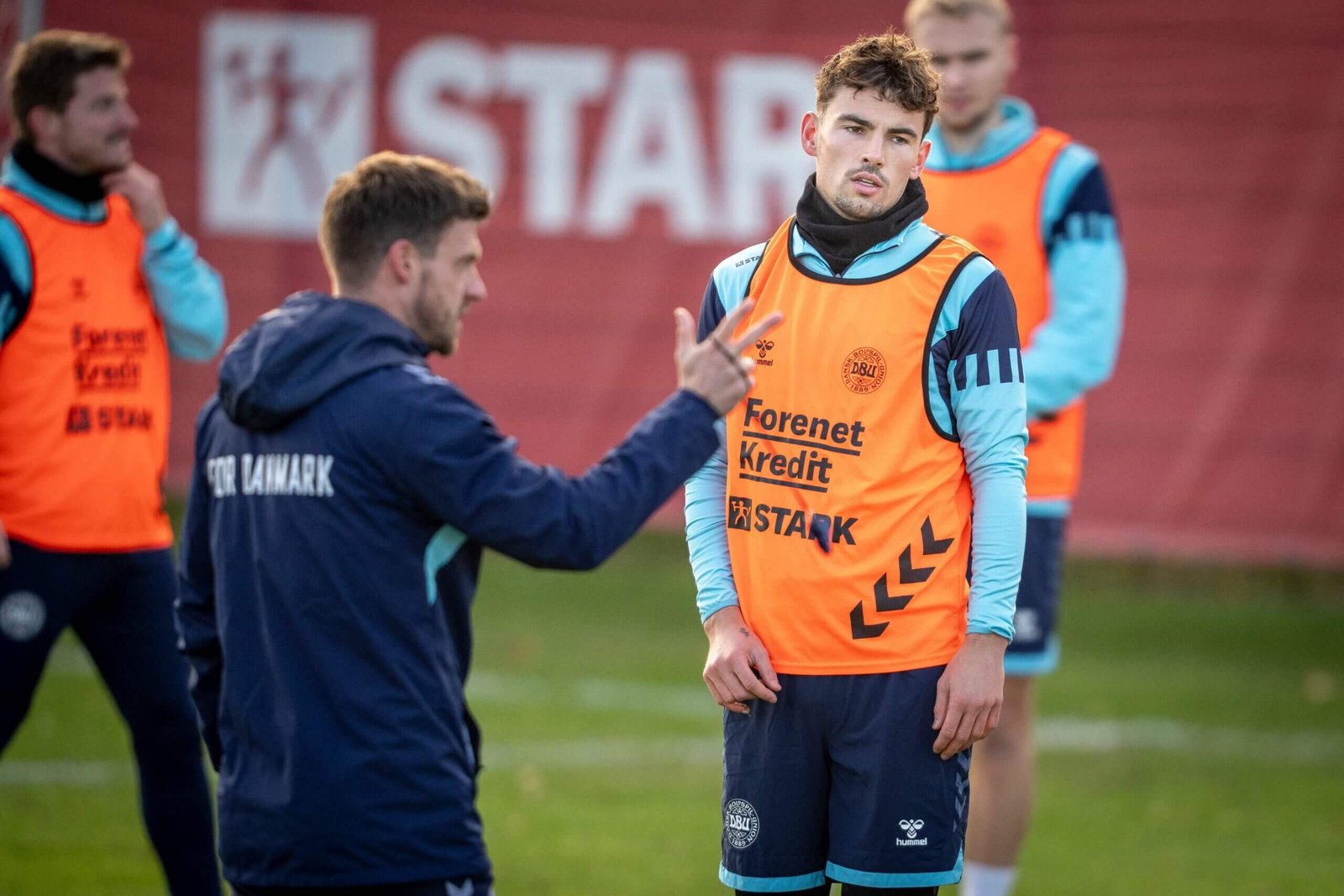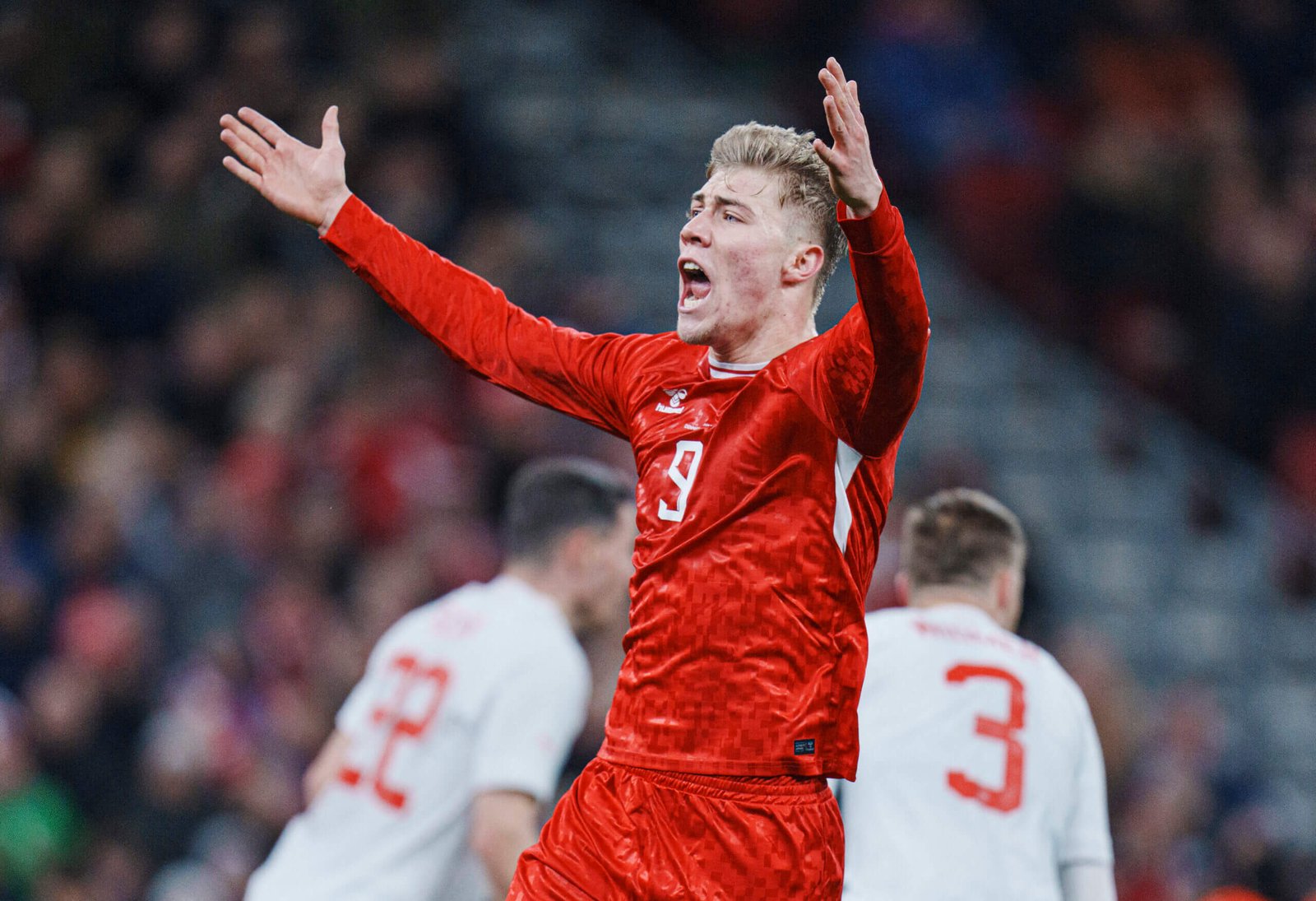Denmark reached the semi-finals of the previous men’s European Championship three years ago, where they took England to extra time, but heading into this summer’s tournament, several nagging concerns dangle over the heads of coach Kasper Hjulmand’s charges…
The manager
Kasper Hjulmand has been in the job almost four years and is now leading Denmark to what will be, slightly surprisingly, their first back-to-back European Championship appearances since they competed in the 2000 and 2004 editions. However, his popularity is on the wane and the mood surrounding him is not what it was back in 2021.
Denmark’s progress through to the semi-finals of those Euros certainly occurred under exceptional circumstances following Christian Eriksen’s cardiac arrest during their opening group match on home turf in Copenhagen, but it also created a swell of goodwill around the team which would actually flow into Danish football as a whole.
Hjulmand led Denmark to the semi-finals of the previous Euros in 2021 (Ida Marie Odgaard/Ritzau Scanpix/AFP via Getty Images)
Today, nobody doubts Hjulmand’s ability as a coach, but there is a conversation about whether he’s getting the absolute most out of a talented generation. Are older members of the squad being given too much game time? Are their likely successors being afforded too little? And is Hjulmand remaining too loyal to players who are not featuring regularly enough for their clubs?
The situation is hardly toxic — nobody is demanding Hjulmand be dismissed — but their qualification campaign was hugely uninspiring (there were losses to Kazakhstan and Northern Ireland, though a 2-1 win against San Marino might have been the low point) and concerns over a lack of evolution are beginning to gather pace.
How to follow Euro 2024 on The Athletic…
The household name in waiting
This should have been Celtic’s Matt O’Riley and his omission will cause some disappointment.
Alexander Sund-Nielsen is an analyst for Copenhagen-based outlet Kvart i Bold. He says of O’Riley, who was born in London and qualifies for Denmark via his mother, “All we hear is how great he’s done at Celtic and there’s bewilderment why he hasn’t been called up more. He is a good example of someone everyone wants to see in the squad but hasn’t been regularly because of ‘the old gang’.”
O’Riley is a really intriguing playmaker and goalscorer, but he did not make the cut. And that does not leave many young players to choose from here. In fact, only two of the 26-man squad are 21 or younger (compared to seven 30 or over, with an eighth leaving his twenties before their first game of the tournament a week on Sunday) — and one of those two, Rasmus Hojlund, plays for Manchester United, so hardly counts as an up-and-comer.
There is not a single player from the domestic Superliga, either, so it is difficult to see anyone really emerging under the Euros lights.
Andreas Skov Olsen maybe? He has just completed the most productive season of his career with 34 goal contributions (scoring 26 times in all competitions), reaching double figures for league goals for the first time since arriving at Belgium’s Club Bruges in January 2022. He is still 24, which seems strange given how long he has been around.
At his best, there’s an ambition and regality to the way Olsen carries possession forward; he is a very optimistic player. He also strikes the ball beautifully with his left foot and has the kind of quality that people can fall for during international tournaments.

English-born O’Riley, right, impressed for Celtic last season but has not made the Denmark squad (Mads Claus Rasmussen/Ritzau Scanpix/AFP via Getty Images)
Strengths
The plus side of the continuity for which Hjulmand is criticised is a squad full of players familiar with each other: particularly in defence and midfield. Kasper Schmeichel and Simon Kjaer were doubts for the tournament having withdrawn from recent squads but are in the 26, and there is huge experience elsewhere — Joachim Andersen, Joakim Maehle, Pierre-Emile Hojbjerg, Jannik Vestergaard — so the Danes will possess a tough centre against group opponents Slovenia, England and Serbia.
Weaknesses
In attack, there is probably too much dependence on Hojlund (seven goals in qualifying), who started to score more frequently for United in the second half of his first English season but is still not ready to assume that sort of responsibility at international level.
Another issue is a reliance on players who are not playing regularly for their clubs.
Eriksen, another Dane at Old Trafford, is the obvious one, but Hojbjerg had a peripheral role for Tottenham last season and while he did start to appear in the Premier League more often towards the end of the campaign, Mikkel Damsgaard has also had a couple of disrupted years with Brentford.

Manchester United’s Hojlund was Denmark’s top scorer in qualifying (Liselotte Sabroe/Ritzau Scanpix/AFP via Getty Images)
Local knowledge
Those with long memories will recall Maehle tweeting “Vi skal ikke hjem, vi skal videre” when Denmark spanked Russia 4-1 in the group stage of the previous Euros three years ago.
And, because of the circumstances around that game and the euphoria it generated, many will also remember the snippet of Danish-language commentary that did the rounds, when the same phrase was used after Andreas Christensen’s blistering finish to make it 3-1 with 10 minutes to go.
“Vi skal ikke hjem, vi skal videre.”
So, what does that mean?
Roughly: “We’re not going home, we’re going further!”
It’s a line from a cult Danish 1970s film called The Olsen Gang In Jutland, which is a madcap adventure story about a hunt for gold in Germany after the Second World War which goes repeatedly wrong but carries on regardless. YouTube it. You’ll get the picture.
And look out for that one again this summer if the Danes do well again.
Expectations back home
Sund-Nielsen says that “expectations are more muted now than they were for the World Cup (Qatar 2022 — Denmark finished bottom, with one point and one goal, in a group containing France, Australia and Tunisia). Based on the qualification, there’s little reason to be overly optimistic. (But) Crashing out in the group will be a disappointing finish. I think the bare minimum expectation is getting out of the group. I don’t think anyone expects more than that, to be honest.
“So for achievement, there’s little expectation. But for the tournament itself, there’s a lot of excitement. Qatar was never popular and with Germany so close — and beer being allowed — there’s a whole different excitement about this one. No one is talking about boycotting anymore (as happened in Denmark with Qatar, due to the host nation’s human-rights record) but just getting excited to spend the summer in Danish shirts. The mood is great — although with more pessimism about their performance than we’ve had in recent tournaments.
“Personally, I don’t see us as a force to be reckoned with this year. The team needs a new generation of energy and leadership and it will inevitably be something that has to happen after the Euros.”
Denmark’s confirmed squad
Goalkeepers: Kasper Schmeichel (Anderlecht), Frederik Ronnow (Union Berlin), Mads Hermansen (Leicester City)
Defenders: Andreas Christensen (Barcelona), Simon Kjaer (AC Milan), Joachim Andersen (Crystal Palace), Jannik Vestergaard (Leicester City), Victor Nelsson (Galatasaray), Alexander Bah (Benfica), Joakim Maehle (Wolfsburg), Rasmus Kristensen (Roma), Victor Kristiansen (Leicester City)
Midfielders: Christian Eriksen (Manchester United), Thomas Delaney (Anderlecht), Morten Hjulmand (Sporting Lisbon), Pierre-Emile Hojbjerg (Tottenham Hotspur), Christian Norgaard, Mathias Jensen, Mikkel Damsgaard (all Brentford), Jacob Bruun Larsen (Burnley), Andreas Skov Olsen (Club Bruges)
Forwards: Anders Dreyer, Kasper Dolberg (both Anderlecht), Rasmus Hojlund (Manchester United), Jonas Wind (Wolfsburg), Yussuf Poulsen (RB Leipzig).
(Top photos: Getty Images; design: Eamonn Dalton)
Read the full article here


